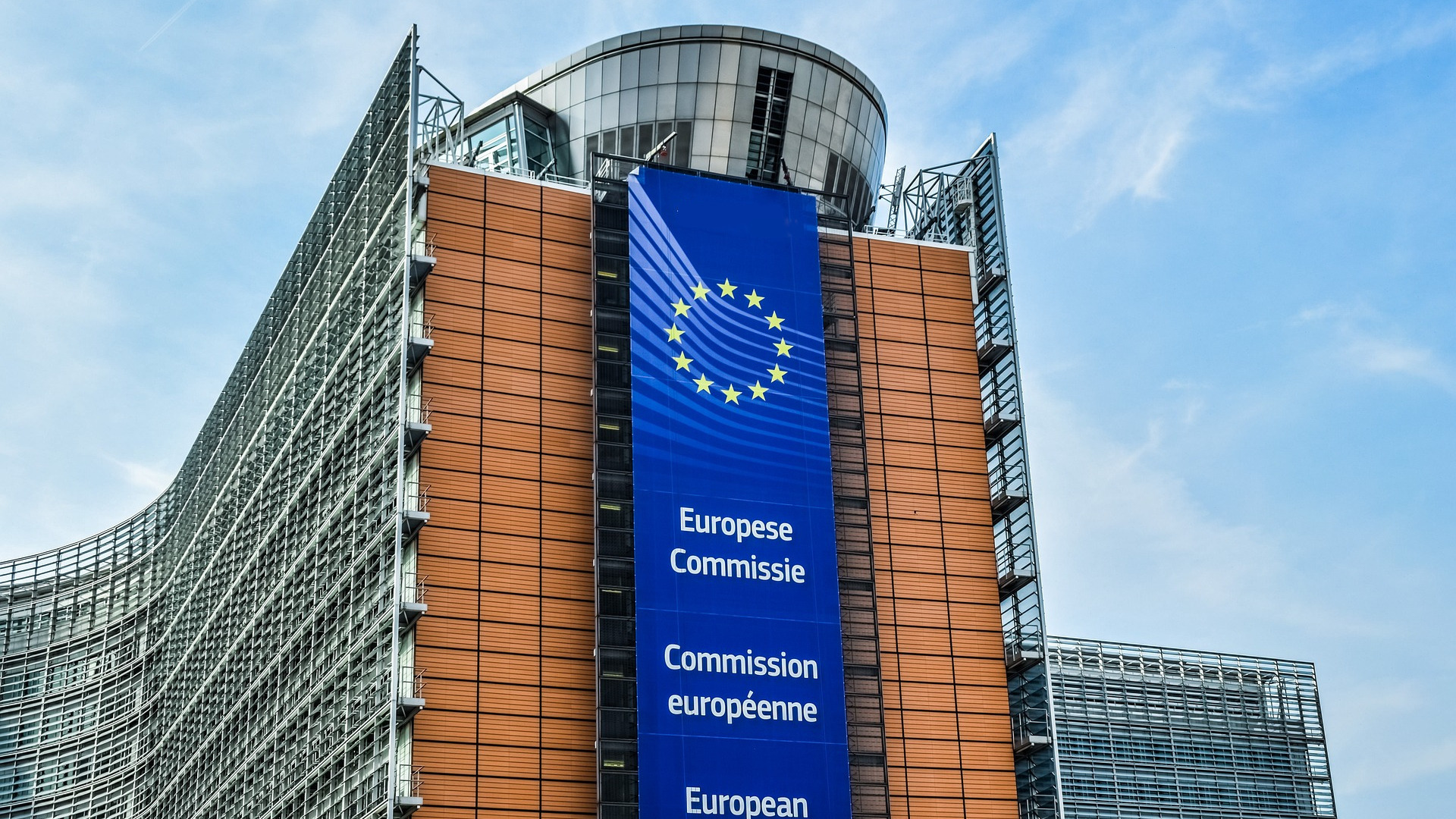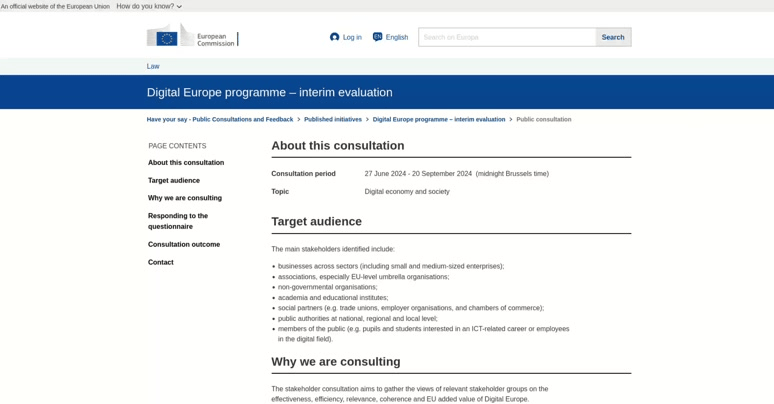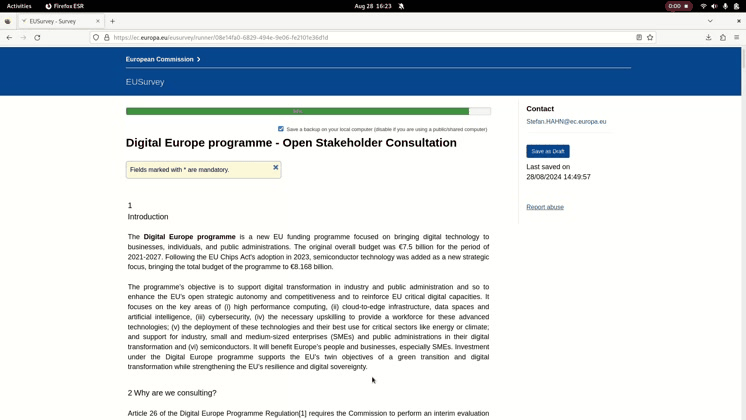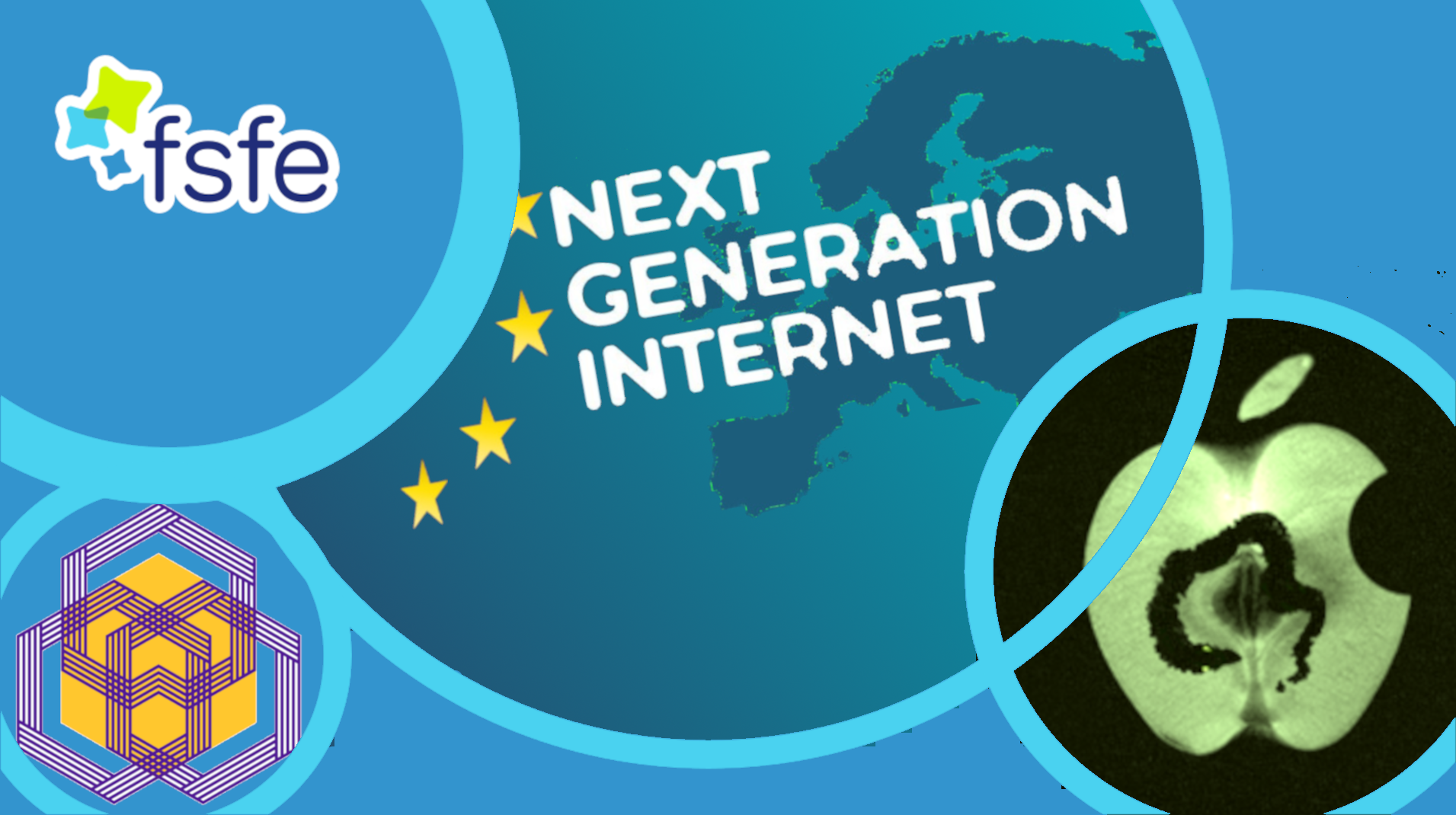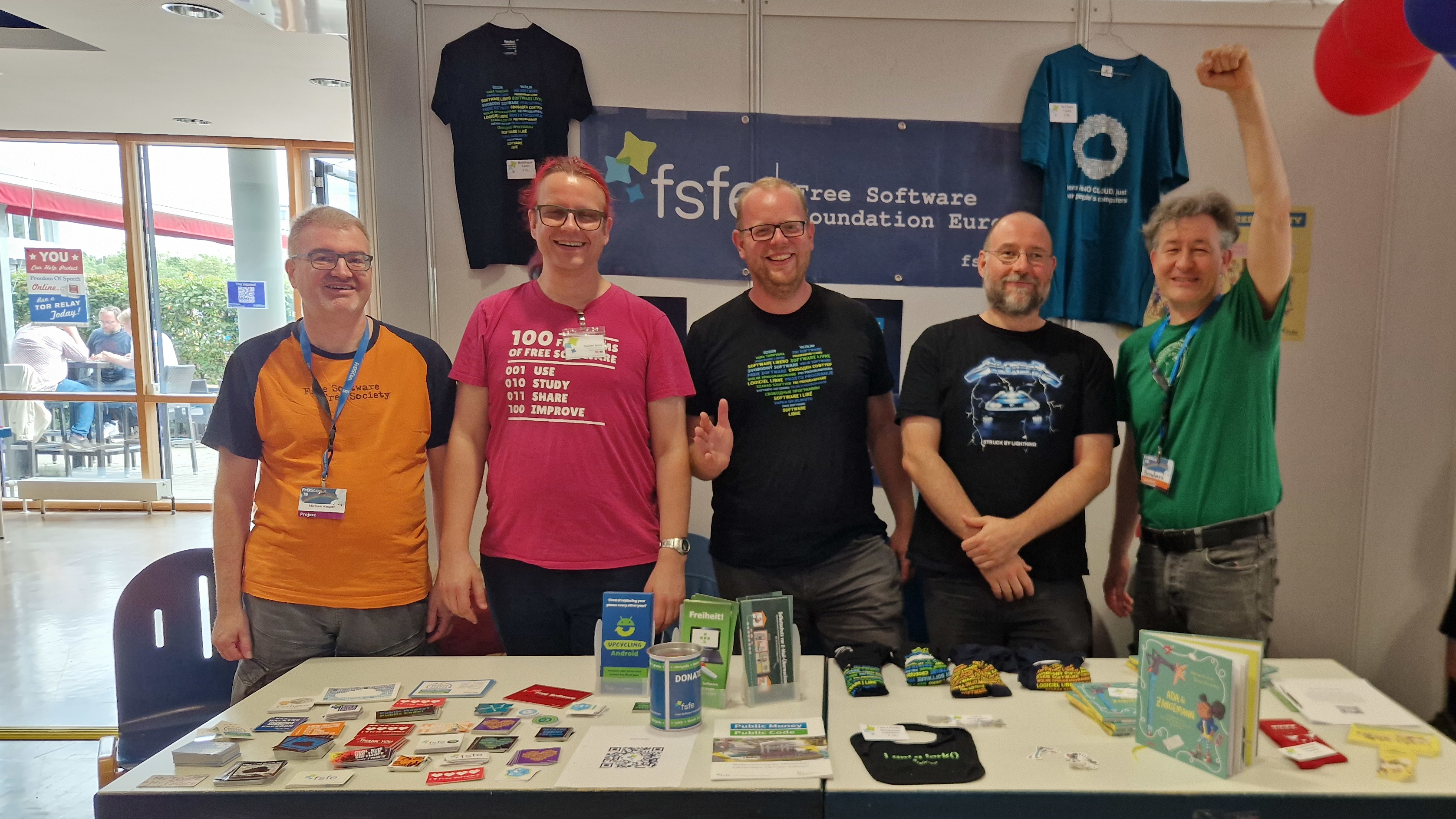Software Freedom in Europe 2024
vendredi 20 septembre 2024 à 01:00Software Freedom in Europe 2024
In 2024, we continued to promote software freedom through our presence at conferences and events across Europe, as well as through our various activities and initiatives. Despite our ongoing financial challenges, we have actively raised our voice in defence of Device Neutrality and are advocating for a dedicated Free Software budget in Europe.
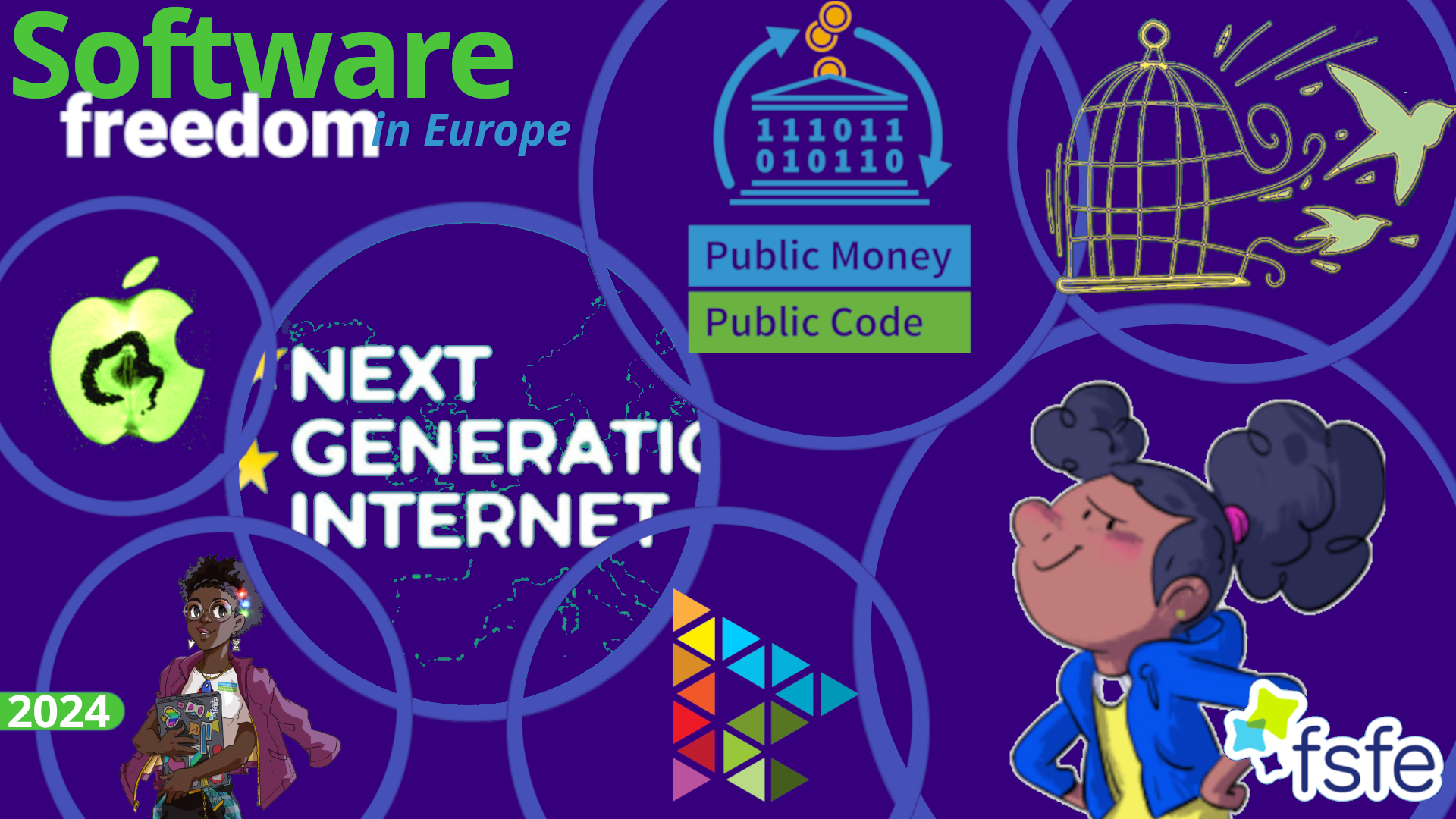
After more than 20 years of promoting software freedom, we have reached a critical point, having faced significant financial challenges in recent years. Our ability to continue our vital work was severely compromised, as our work was threatened by a decline in supporters, compounded by economic pressures such as rising inflation. For the first time, we were forced to send out an urgent appeal via email - a heartfelt and unprecedented ask for help to our community, emphasising that without immediate and substantial support, the FSFE's long-standing mission to protect and promote software freedom across Europe would be in jeopardy. Fortunately, the response from the community was overwhelmingly positive. Many supporters stepped forward and helped to stabilise our immediate situation.
Our work is far from complete, and continuous financial support is crucial to sustaining our mission. Software freedom is a long-term struggle that demands persistent effort, dedication, and resources. The importance of this ongoing fight is underscored by recent events, such as Apple's litigation with the European Commission to avoid complying with the Digital Markets Act (DMA). The FSFE is the only non- profit that is intervening, with the aim to to leverage the voice of the Free Software community against the company’s unfair practices This endeavour can take decades and it is a complex, time-consuming, and resource-intensive endeavour but we strongly believe that we need to be there to defend Device Neutrality and the interests of the Free Software community.
Unfortunately, the broader landscape for Free Software is facing more additional challenges. Recently, the European Union decided to cut its funding to the Next Generation Internet (NGI) initiative, highlighting a critical issue: the lack of secure, long-term financial support for Free Software. Software freedom requires not only nice words but also proper public funding. Free Software is essential for ensuring transparency, security, and innovation in the digital age, and without steady support, these values are at risk. It's crucial that policymakers recognize the importance of Free Software and advocate for its continued growth and protection to ensure that technology remains a tool for empowerment.
We have continued initiatives such as the Router Freedom wiki and our "Public Money? Public Code!" initiative, where we have started to focus more on watchdog activities, monitoring real progress towards Free Software in public administrations and speaking out when we see steps in the wrong direction. We continued to raise awareness of Free Software and its importance for a democratic society through active participation in conferences, celebrating the "I Love Free Software" day, and through the work of our local groups across Europe.
In the last months we have continued focusing also in the younger generations. In this regard, the third edition of "Youth Hacking for Freedom" (YH4F) is underway, with preparations for the fourth edition already in progress. The Ada & Zangemann book, is becoming a well-known open educational resource, being translated into 10 languages, while its readings continue to inspire and educate. Additionally, we are working on producing a film about Ada’s story to further amplify its impact and reach a broader audience.
As we navigate these challenges, it is clear that our mission to promote software freedom and empower users to control technology requires a sustained, long-term support commitment. The recent outpouring of community support is a beacon of hope, but the road ahead is long and fraught with obstacles. We must continue to advocate for the public funding and political support necessary to safeguard the Free Software community. By continuing to focus on education and public outreach, especially to younger generations, we are laying the groundwork for a future where software freedom could thrive. With your continued support, we can continue our work and ensure that we get closer to our vision of software freedom for the decades to come.
Our Software Freedom in Europe 2024 report covers the FSFE's activities from October 2023 to August 2024. We hope it gives you a better understanding of our daily work and that you enjoy reading it!Table of contents
- Device Neutrality: the Free Software community “shows its teeth”
- Next Generation Internet and the lack of long-term sustainable funding for Free Software
- Reaching Generation Alpha: Youth Hacking 4 Freedom and Ada & Zangemann
- Policy work: Advocating for Free Sotware
- Legal Support: giving advise to projects and individuals
- Our work on public awareness
- Join the movement
Device Neutrality: the Free Software community “shows its teeth”
Device Neutrality empowers users to take control of their devices, allowing them to choose how and what software they run, free from restrictions imposed by manufacturers or software vendors. This control is essential to ensure that users are not locked into a particular operating system or forced to use pre-installed applications. Device Neutrality promotes innovation, competition and consumer rights by preventing monopolistic practices and enabling a diverse software landscape.

Free Software is key for Device Neutrality, and this issue has become increasingly important as large technology companies tighten their grip on the devices and operating systems they control, raising concerns about privacy, digital rights and market dominance. In 2024, the FSFE has faced monopolistic power over devices heads on. Notwithstanding the dangers of giant corporations over the entire digital markets, the FSFE performed key contributions to safeguard software freedom: we got involved in strategic litigation against Apple, coordinated key interventions with different civil-society stakeholders, and have been closely working with the Commission on the implementation of the Digital Markets Act. In all these processes, we leveraged the voice of the Free Software community, focusing on the benefits of smaller Free Software projects for digital markets.
Strategic litigation against Apple’s monopolistic control over devices
The Digital Markets Act (DMA), which came into effect in early March, introduces significant provisions that directly impact Free Software. This law requires "gatekeepers" to permit the direct installation of software from any source, commonly known as (sideloading). Additionally, it mandates that gatekeepers must support alternative app stores and repositories, giving users more choices in how they access and manage software. The DMA also imposes interoperability obligations, ensuring that third-party developers have access to the same hardware and software functions as the "gatekeepers." These measures collectively aim to enhance competition and innovation in the digital marketplace.
Apple was designated as “gatekeeper” in September 2023, but started litigation against the Commission in December, 2023. The company has pushed an aggressive approach against the DMA, proposing new terms and conditions that harm Free Software. In February 2024, the FSFE decided to intervene, pairing up with the Commission to protect Free Software against Apple’s strike against DMA. In August 2024, the Court of Justice of the European Union authorized the FSFE to intervene in the case. This is a far-reaching case with deep consequences not only for Software Freedom, but for fairness of digital markets, open internet and digital democracy.
 Cutting out the rot in Apple, the FSFE intervenes to safeguard Software
Freedom. CC-BY-SA 4.0 by Rahak for the FSFE
Cutting out the rot in Apple, the FSFE intervenes to safeguard Software
Freedom. CC-BY-SA 4.0 by Rahak for the FSFE
Implementing the DMA: leveraging the voice of the Free Software community
As the Apple’s example demonstrates, abusive gatekeepers’ behaviour requires constant monitoring. Implementation of the DMA has been technically and legally challenging, as “malicious compliance” from gatekeepers has posed real risks to Software Freedom. The FSFE has been working with a large spectrum of community actors. For instance, the FSFE worked with F-Droid, The App Fair Project and other interoperability experts to investigate Apple's DMA compliance and it's impact on Free Software. During the past months, we coordinated several expert workshops with stakeholders, discussed with regulators in FOSDEM, had official meetings with the EU Commission's DMA team, and submitted a comprehensive position to the European Commission detailing several problematic elements in Apple's compliance that will harm Free Software. FSFE also submitted a joint position to the Commission highlighting the main problematic aspects of Apple's behaviour towards Free Software. Furthermore, FSFE submitted its feedback to the United Kingdom’s Competition and Markets Authority on the regime guidance, emphasizing the importance of Free Software for fair digital markets, as envisioned in the newly enacted Digital Markets, Competition and Consumers Act (DMCCA). In collaboration with F-Droid, the FSFE also prepared a study for Japan's competition authority, the HDMC, on how Apple's compliance with the DMA poses a risk to Free Software and Device Neutrality.
We are calling for volunteers and civil society organisations to help us resonating the message against monopolization of digital markets. We need robust support from policy makers for Free Software, so alternative to gatekeepers can flourish in a fair and safe environments.
In addition to this, at the beginning of August we have announced that we are intervening in the case of Apple vs Commission to uphold the DMA. It is a litigation brought by Apple against the European commission in the Court of Justice of the European Union (CJEU). Following the FSFE’s application for intervention, the court recognized the FSFE’s interests in the case as a stakeholder and allowed the intervention. We will submit our arguments to the court by mid-September.
Router Freedom: several victories notwithstanding the outbreak from telcos
Although we should be free to choose the technical devices we use in our private lives, some Internet Service Providers (ISP) still unduly limit how customers have to use to connect to the Internet, or discriminating against owners of alternative devices. This undermines Router Freedom.
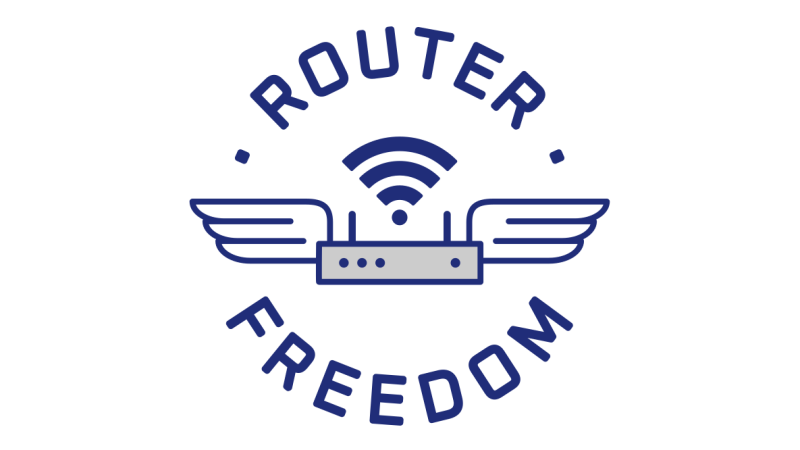
In the last year, we have accomplished a lot! We participated and monitored regulatory processes in Germany, Austria, Italy and Belgium. Fiber operators have pushed against Router Freedom, bringing regulators to court and asking for regulatory exceptions. The FSFE has coordinated efforts with a broad spectrum of stakeholders, including volunteers, business representatives, digital right groups and consumer protection organisations to repel these reactionary initiatives from telcos.
- Germany: Fiber operators required the national regulator BnetzAg to create an exception against Router Freedom, asking to take end-users’ freedom over equipment by imposing their own fiber terminals. The FSFE intervened in the process, claiming that Router Freedom is key for open internet and net neutrality, so the regulator should confirm its own 2016’s decision to safeguard Router Freedom for all network topologies.
- Belgium: As a decisive victory, the Belgian regulator BIPT has introduced Router Freedom for all types of network in the country. The FSFE has participated as a key stakeholder in the process, contributing to BIPT’s work, presenting the views of the community and end-users. Later in 2024, the telecom operator Orange has started litigation against the regulator, asking for a exception for fiber, claiming the regulator was not diligent in the decision making. The court ruled against the operator, confirming the diligent work of BIPT in analysing all the benefits of Router Freedom for end-users and digital markets, stating all the allegations undue. This decision represented a decisive victory for Router Freedom, as for the first time, a court confirmed a regulatory procedure involving fiber networks. The FSFE demanded that other regulators take this as an good example. Lucas Lasota, Legal Programme Manager, speaking at the DORS/CLUC 2024 conference on "When our routers are not free: the challenges for an Open and Neutral Internet".
- Austria: Despite of the outcry of a broad spectrum of stakeholders demonstrating to the Austrian regulator RTR the necessity of regulating Router Freedom, the authority dismissed the case with no further consideration. The FSFE has been very active in the country, coordinating efforts with civil-society, industry representatives and policy makers, but nonetheless the regulator decided to follow the telecom operators’ interests in not attending civil-society demands.
Making Router Freedom easier for users: the tech wiki
Aside our policy and legal efforts ito conduct a European-wide initiative to defend the rights and interests of end-users regarding Router Freedom, the FSFE has launched an initiative exclusively dedicated to end-users: practical guide for interested technical people desiring to change their router provided by the ISP, helping them on the path (sometimes not so trivial) of installing their own private router at home. We introduce the new Router Freedom tech wiki, prepared by our Netherlands team of volunteers!🎉
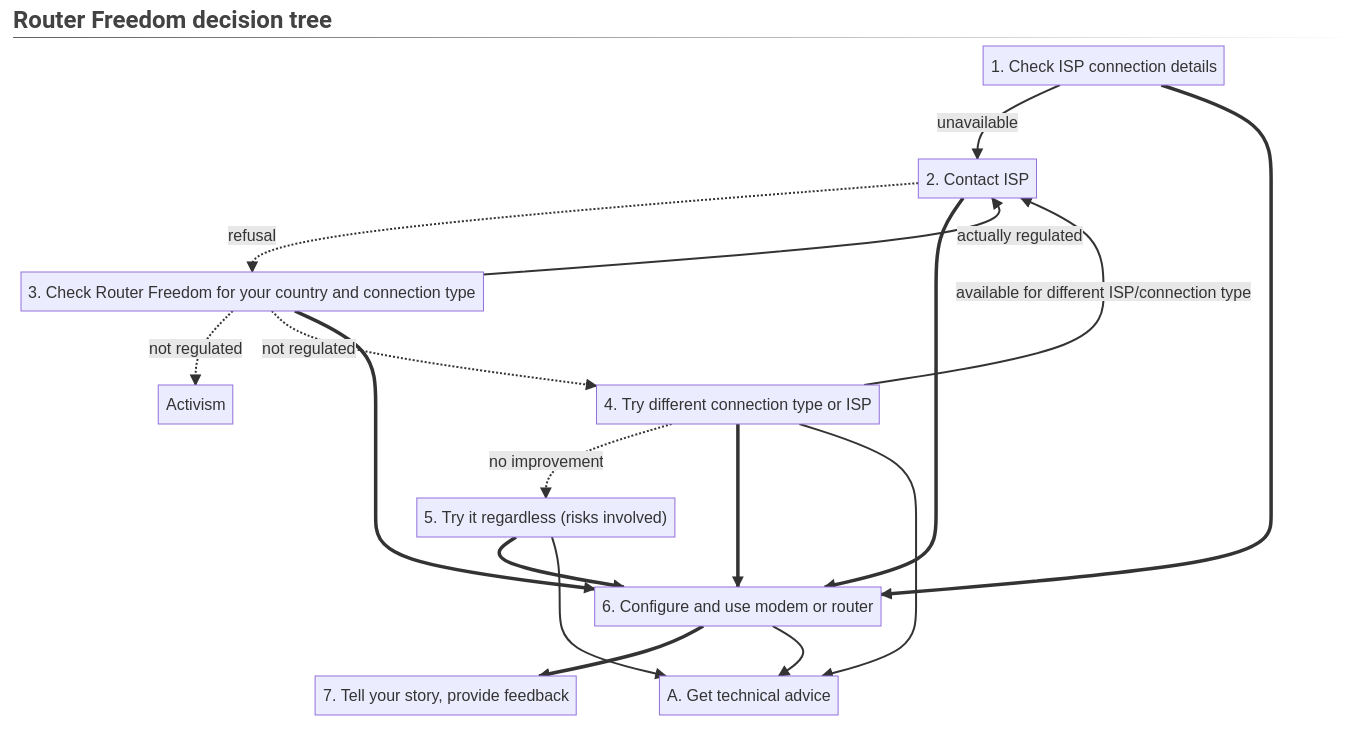 The Router Freedom tech wiki helps you with basic information on how to start using your own router
The Router Freedom tech wiki helps you with basic information on how to start using your own router
This wiki helps you to replace the ISP’s router/modem with your own. Most modems of the internet service provider allow you to set them in 'bridge' mode, so you can use your own router for the internal networking. Although this allows you to separate your internal networking from the ISP, you would end up with two devices where you could just have one.
Device Neutrality website
This year we launched a new landing page about Device Neutrality to ensure that everyone, regardless of their technical background, can grasp the basics of this crucial concept. The landing page is designed to, in a simple and easy way, explain the essential. By making it simple, we aim to raise awareness and foster a broader understanding, helping users recognize the importance of supporting and advocating for Device Neutrality in their own digital lives.
Also, following the page design, we created a poster with the basics which you can order from us to promote Device Neutrality in your office, university, or at events.
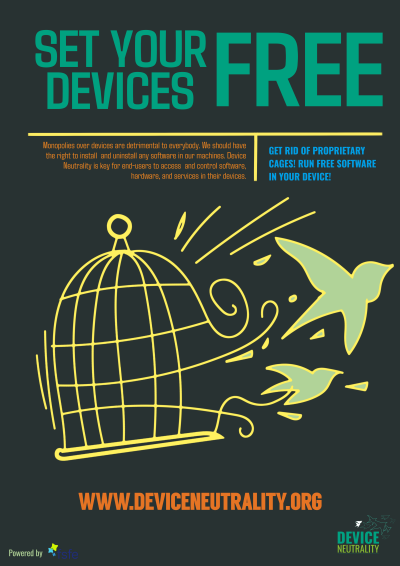 Device Neutrality Poster
Device Neutrality Poster
Next Generation Internet and the lack of long-term sustainable funding for Free Software
Although it had proven its success, a couple of months ago we found out that the European Commission is cutting its funding in the current draft for the Horizon Europe 2025 Work Programme. This decision highlights the larger problem of the lack of motivated and sustainable public funding for Free Software projects.
For years, we have been advocating for the need for public funding for Free Software, as software freedom guarantees that software remains a tool for empowerment, fostering independent development and innovation. Through our 'Public Money? Public Code!' initiative, which continues to gain support from organizations signing the Open Letter, we are raising awareness at conferences, events, and in explaining it to politicians.
'Public Money? Public Code!' demands that software developed for public sector must be made publicly available under a Free Software licence. Free Software in public bodies guarantees freedom of choice, access, and competition. This allows our public administrations to regain full control of their digital infrastructure and therefore become and remain independent from a handful of companies.Looking to the future, particularly in light of potential funding cuts for Free Software projects under the Next Generation Internet (NGI) initiative, it’s clear that sustainable funding for Free Software must be addressed at the European level. Establishing a long-term funding scheme is crucial. In the coming years, our policy efforts will focus on raising this issue across Europe, ensuring that fragmented, limited, and uncoordinated funding for Free Software becomes a thing of the past.
The recent cut of €27 million from the NGI initiative has exposed the vulnerability of financial support for software freedom, highlighting a critical problem: Europe needs sustainable, secure, and dedicated funding to maintain control over its technology through Free Software. Much of Europe's digital infrastructure depends on these projects to ensure technological independence and resilience. Reducing or cutting this funding endangers Europe’s autonomy in the digital realm. In response to the European Commission’s ambiguous stance on future funding, the FSFE has participated in the latest public consultation, advocating for the long-term financial backing Free Software solutions need to drive Europe’s digital transformation.
Since November 2018, the FSFE has been a partner organisation of Next Generation Internet Zero (NGI0), which is a coalition of non-profit organizations from all over Europe coordinated by the NLnet Foundation. Coming under the overall NGI umbrella, the purpose of NGI0 is to provide financial grants and technical support to researchers and developers who are working on Free Software solutions that contribute to the establishment of the Next Generation Internet. As a part of the NGI0 consortium, the FSFE is providing support to Free Software projects with their legal and licensing issues, as well as introducing them into the REUSE specification, a tool that can simplier the license process.
Currently, the FSFE is working on four NGI0 programs: NGI Entrust, NGI Core, NGI Review, and NGI Commons Fund programs.
REUSE, make licensing easy
REUSE helps make a project's licensing and copyright status more transparent, ensure that third-party code is properly attributed, and make the project's code easily reusable. This tool is currently used worldwide and its specification has been adopted by several corporate and institutional projects.
REUSE is constantly evolving and improving. Last June the alpha version v3.1.0a1 of the REUSE tool was released containing the new REUSE.toml functionality, and after the publication of the REUSE Specification v3.2, soon v.3.3 will be released. Currently, the tool is in its version v4.0.3.
"Free Software is an important basis for DLR’s software development efforts. There is likely no software project which does not rely on at least one Free Software library or uses a Free Software tool to aid in the process of software development" -Tobias Schlauch, research software engineer at the DLR, talking about the use of REUSE specification in some of their projectsMore and more organisations, companies, and individuals are using REUSE and benefiting from the growing ecosystem of its specification, its helper tool, its API and all the documentation. As using REUSE does not require registration, there are not precise numbers about its users but we know that it is being adopted by:
- All 2000+ compliant projects of the REUSE API
- Many projects of the EU-funded Next Generation Internet project we help to become REUSE compliant from the start.
- DLR, the KDE community, and Software Heritage made REUSE the standard for their licensing policy.
- Corporate licensing policies of Siemens, SAP, Huawei, Liferay, and many more.
- Large parts of the Linux Kernel with ~70% by now.
Reaching Generation Alpha: Youth Hacking 4 Freedom and Ada & Zangemann
Educating and supporting the young generation in the learning and use of Free Software is crucial to the mission of the FSFE. Through our activities in this field we are fostering innovation, collaboration, and digital literacy in the future. We are supporting a generation that can control their technology and empowering themselves. The children's illustrated book Ada & Zangemann introduces the concepts of Free Software to young readers, making these complex ideas accessible and sparking curiosity. Our Youth Hacking 4 Freedom contest is aimed at teenagers, who want to create, share and improve software.
With these two activities, the FSFE encourages the next generations to become active contributors to the digital world, shaping technology, rather than mere consumers.
Youth Hacking 4 Freedom: teenagers coding great ideas
Young people, from all over Europe, compete in Youth Hacking 4 Freedom to win cash prizes by creating programs of their choice licensed as Free Software. The six winners are invited to the Award ceremony weekend.
Second edition: In October 2023 we had the Awards Ceremony weekend in Brussels with the winners and members of the jury from that edition. 2023 winners were:
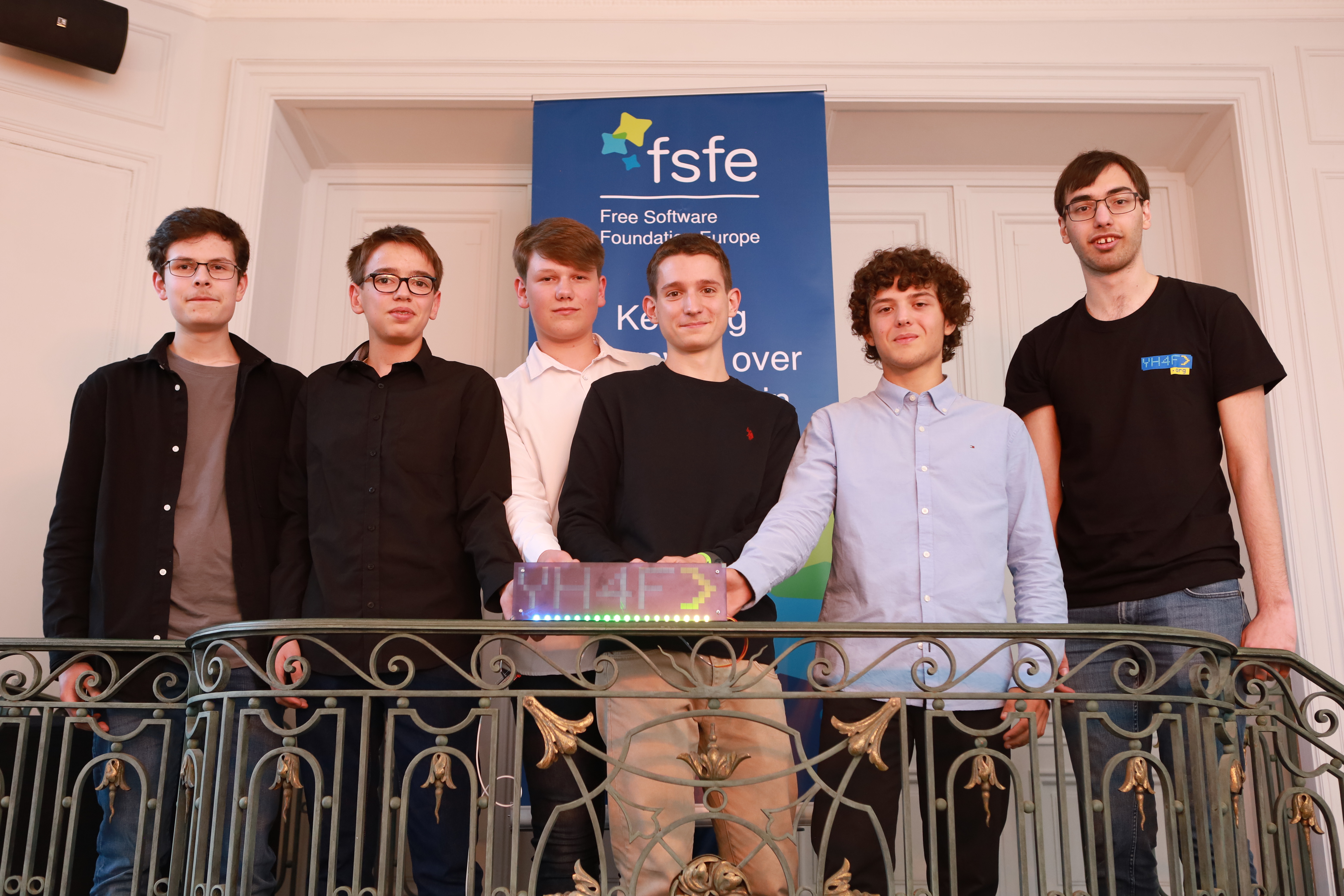
- Ultimate Hacker Award: Davide Rorato for ArduPlot
- Elite Hacker Award: Marlon Wolff for ClassQuiz
- Awesome Award: Simon Sommer for OpenRadio
- Best Maker Award: Oriol Villegas Martin for DogBag4City
- Best Freedom Project Award: Marius Angermann for Artix Engine
- Best Power User Tool Award: Matthias Kaak for hashfindutils
During this year we also learnt a bit more about some of the projects and their developers thanks to our YH4F interviews to participants.
Third edition: In October 2024, we will announce the names of the 2024 YH4F winners, marking the end of a journey that began at the end of 2023 when they registered to take part in this edition. From January to the end of June, the participants worked on their projects. During this time, they had the opportunity to meet online once a month and get advice from experts while networking with their peers. A broad group of technology experts, the YH4F Jury, then evaluated the projects submitted at the end of June.
Also during this year we presented this contest in different conferences such as FOSDEM, Chemnitz Linux Days and esLibre.
For the new edition, starting in January 2025, YH4F got a new sponsor on board.
Ada & Zangemann: Italian, French and Spanish version
The illustrated book Ada & Zangemann - A Tale of Software, Skateboards, and Raspberry Ice Cream" by the FSFE, tells the story of the famous inventor Zangemann and the girl Ada, a curious tinkerer. Ada begins to experiment with hardware and software, and in the process realises how crucial it is for her and others to control technology.
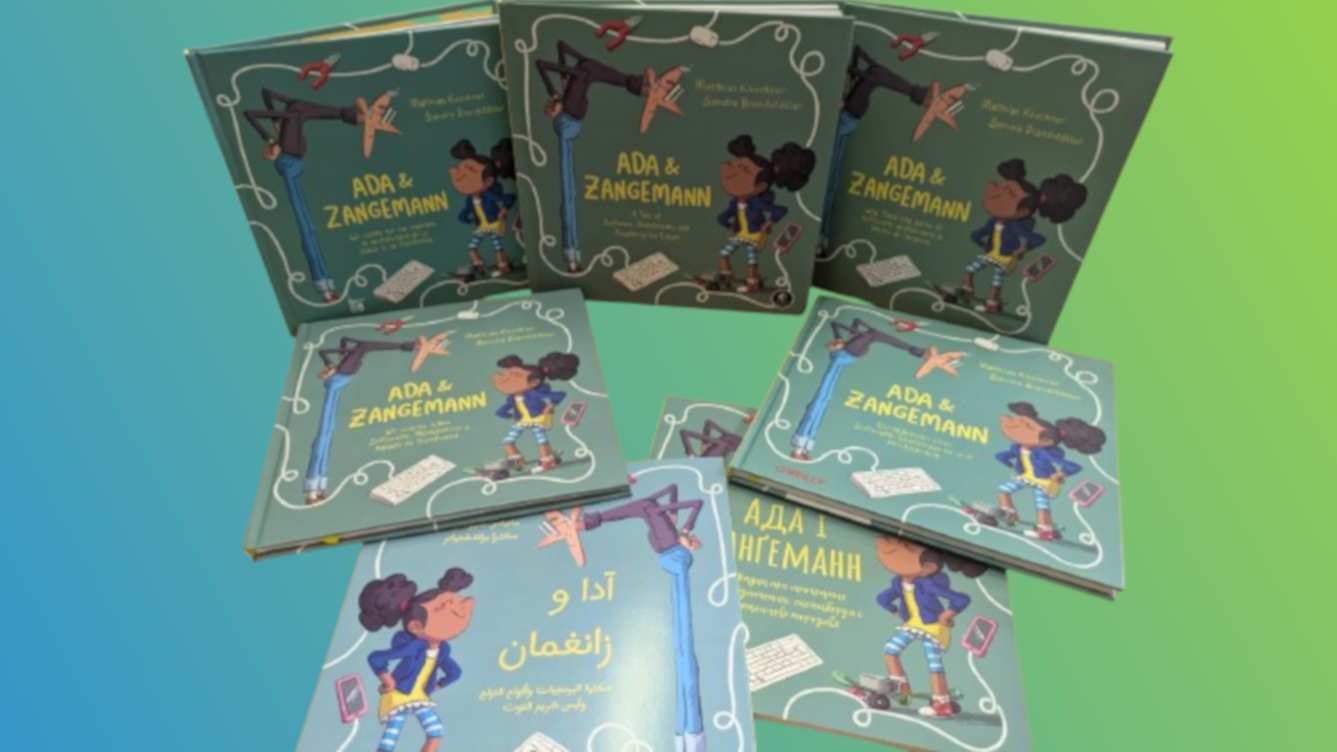
During this last months, we got a lot of amazing and interesting news about Ada, from book readings to new translations to the project of making a film of this story.
The first reading of the story of Ada in Italian took place during Software Freedom Day and to make it even more special, everyone enjoyed home-made ice cream thanks to one of our volunteers!
The story of "Ada & Zangemann" was also published in French and, thanks to the French Ministry of Education, you can download the ebook free of charge or read the mobile friendly online version. The book was translated into French by more than a hundred students, aged 13 to 19, from four different schools in France, over the course of the 2022-2023 school year, sharing the work and coordinating it using online tools.
The book was covered in a radio interview by "Radio France", in several articles, including Le Monde, ZDnet, or blogs, as well as TV coverage at Sqool TV with Alexis Kauffmann, from the French Ministry of Education and the person who started with the idea of the French translation.
Last December the, at that time, French Minister of Education, Gabriel Attal, presented the book "Ada & Zangemann" to the French German parliamentarians meeting (APFA) in the old Bonn parliament. Afterwards he gifted the book to Anke Rehlinger, Minister President of the Saarland (Germany).And even more! The book was awarded the 2024 Youth Book Prize of the InCyber Forum Europe. This is the first time this prize has been awarded to a children's book. And 300 copies of Ada & Zangemann were distributed to teachers at the Journée du Libre Éducatif 2024. The book was presented at this fair, that this year was held in Paris, by two of the students who translated it.
 David Revoy painted this great version of Ada
David Revoy painted this great version of Ada
Thanks to the Volkswagen Group in Spain, the story of Ada & Zangemann is now being printed in Spanish! The company has distributed 500 copies to its employees and, from September, its STEM team will be embarking on a 'STEM tour', visiting schools in several Spanish cities around the country to share the story encouraging children, and especially girls to get into STEM.
To reach even more children, we are currently working to have an "Ada & Zangemann" movie produced by a professional 2D animation studio. We plan to release the movie in four languages by the end of this year as an Open Educational Resource under a Creative Commons Licence, the same one that Wikipedia has. Everyone will be able to download and share it, use it in schools, and integrate it with other educational material, making a difference to the quality of IT education that is so vital for young people in our digital society.
They are young + they need the code", FSFE's Format to bring Free Software in the schools (online)
The FSFE's pilot project “They are young + they need the code” is inspired from the book Ada&Zangemann. This educational format, designed by the FSFE, helps the children to understand the importance of controlling their own technology, through reading the book and manual activities. Currently the project is taking place in Italy and we are waiting to hear back from our volunteers, which are bringing the format to the schools and or libraries.
Free Software Knowledge IT Project, partnership with Edulife
At the end of last year, during SFSCON 2023, the FSFE and the Edulife Foundation kicked off a collaboration project to raise awareness about the benefits of Free Software to the next generation of innovators.
The project consists in a two-year agreement to deliver educational content to students from the ITS Academy LAST about Free Software legal aspects, policy and public awareness. Last January, and as part of this studies academic program, the FSFE delivered educational content about Free Software, with a focus on Free Software legal issues, policy aspects and public awareness in the form of lectures. Besides, again this year the students will attend SFSCON.
Policy work: Advocating for Free Software
Political decisions and policies within the European Union significantly impact Free Software, its ecosystems, and its communities. Since 20 years the Free Software Foundation Europe (FSFE) engages with policymakers to ensure that the Free Software community voice is heard. Advocating at the European level for software freedom is essential to make decision-makers all over Europe understand the importance of Free Software in our society.
This past year has seen the adoption of important pieces of legislation which the FSFE has been active on, such as the Interoperable Europe Act, the Artificial Intelligence Act, the Product Liability Directive and the upcoming adoption of the Cyber Resilience Act.
Looking at the future, especially in light of the recent developments around the possible cuts of funding directed to Free Software projects with the Next Generation Internet (NGI) initiative, Free Software funding urges to be addressed at the European Level with the institution of a long-term sustainable funding scheme. In the next year(s), our policy efforts will be also focused to raise this issue at the European level, and we will make sure that uncoordinated, scattered and small funding for Free Software will not be the norm any more.
Liability in the AI, PLD and CRA
During the past year, the EU has been debating the introduction of liability rules for software, including Free Software, in different legislation, namely the AI Act, Product Liability Directive and the Cyber Resilience Act. The way they were first proposed, all proposals would have harmed the Free Software ecosystem and thus the society and the economy.
The main debate around this proposal focused on liability. With different wording, the three proposals initially excluded liability of Free Software only outside the course of a commercial activity. This would have failed to address a large part of software that is deployed and at the same time smaller and non-profit projects would have been harmed as they would have to bear major costs and face legal risks even if there was any kind of commercial activity, like in the case of voluntary contributions to code.
Already at an early stage, the FSFE argued in a hearing in the EU Parliament, for the inclusion of clear and precise exemptions for Free Software development in the legislation and for liability to be transferred to those who significantly financially benefit from it on the market.
The co-legislators have largely complied with our demands and following intensive debates, have significantly improved the Commission’s proposal, by introducing an exemption for Free Software and including it in the articles of the regulations.
Even if with different wordings, this position has been voted in the PLD and the AI Act, but still needs to be finally voted in the CRA.
Interoperable Europe Act
The EU's Interoperable Europe Act aims to improve cross-border digital public services. The Free Software Foundation Europe (FSFE) has called on policymakers to recognize the importance of Free Software in achieving this goal. Following the "Public Money? Public Code!" initiative, we have been emphasizing the need for public administrations to have control over the software they use while ensuring efficient use of public funds.
Despite efforts to include the Free Software community in the decision-making process through the soon to be implemented Interoperable Europe Board foreseen by the regulation, the Free Software community will only be involved in the Interoperable Europe Community. However, this involvement allows our Community to offer expertise, highlighting the need to closely monitor the regulation's implementation to identify opportunities for effective contributions from civil society.
While acknowledging some shortcomings and ambiguities in the wording of the Act, we welcome certain victories. For instance, the European Commission is now required to provide an annual report on Free Software interoperability solutions and support actions that promote these solutions. These measures will help assess the Act's success in prioritizing Free Software and allow us to continue our oversight role.
Cyber Solidarity Act
The Cyber Solidarity act aims at strengthening collaboration among EU member states around Cyber Security, in order to strengthen solidarity and capacities in the Union to detect, prepare for and respond to cybersecurity threats and incidents.
Already in a hearing at the Committee of the Regions, we highlighted that in order to establish trustworthy and resilient systems, public bodies must ensure they have full control over the software and the computer systems at the core of their state digital infrastructure, and this is only possible prioritizing the use of Free Software.
Furthermore we advocated for the inclusion of civil society in the implementation of the act, and we welcomed that legislators agreed on including different stakeholders in the legislation.
However, in the recent framework of EU regulations aimed at enhancing digital infrastructure security, in the Cyber Solidarity Act, legislators failed to recognise the importance of Software Freedom when it comes to developing ad-hoc tools.
Political decisions and directions have big impact on Free Software, its ecosystems and its communities.It is impossible to achieve Device Neutrality, and a free and open internet without the commitment of the public sector to maintain a vigorous and sustainable ecosystem through policies and funding.That is why it is important that we are keep educating decision/makers in the importance of software freedom.Liability, Cybersecurity and Free Software
The Free Software Foundation Europe (FSFE), along with NLnet Labs and the Open Source Security Foundation, submitted feedback on the Network and Information Security (NIS) implementation act, emphasizing the need to protect the European Free Software ecosystem. The NIS2 implementation act, which focuses on cybersecurity regulations, also impacts the Free Software ecosystem in Europe. It's essential that these measures enhance cybersecurity without hindering Free Software development, as Free Software is a vital component in this field.
In their joint feedback to the European Commission’s draft NIS2 Implementing Act on "Cybersecurity risk management & reporting obligations for digital infrastructure, providers, and ICT service managers," the FSFE and its partners expressed concerns about the focus on business-to-business (B2B) relationships. They pointed out that many complex software products, central to the digital infrastructure sector, are often developed by independent individuals, non-profit organizations, or academic institutions. In these cases, beyond the freedoms provided by Free Software licenses, there is no formal relationship between the developer and the entities covered by NIS2.
Public Money?, Public Code! demands at the European Union
The FSFE has also taken part in crucial consultations at the European level. For the FSFE is important to give input in this kind of processes as it makes the free Software community’s voice heard, and we can make sure the the community demands reach the European Institution in crucial phases of the legislative process.
- Software Freedom Funding
- European digital infrastructure needs a Free Software first approach
In the wake of the recent €27 million cut in the NGI funding, the Free Software Foundation Europe has responded to the growing concern by asking the community to take part to a public consultation of the European Commission, which asked for feedback on their Digital Europe funding programme.
The community stressed the /news/2024/news-20240911-01.htmlurgent need for sustainable, long-term financial support for Free Software to ensure Europe's technological independence. Europe needs sustainable, secure, and dedicated funding to ensure its control over technology through Free Software. Much of Europe's digital infrastructure relies on Free Software projects to ensure independence and resilience. Reducing or cutting funding threatens Europe's technological autonomy. With the participation of our community in the public consultation, we ensured that Free Software solutions receive the long-term funding they need.
We will keep you up to date on this issue, as the consultation will be at the end of the process at the time of publication of this report..
In its response to the European Commission's consultation on the white paper "How to Master Europe’s Digital Infrastructure Needs?", the FSFE highlighted the vital role Free Software plays in creating robust digital infrastructure across Europe. We argued that embracing software freedom can address challenges at various levels—global, regional, and local—by fostering collaboration, openness, and the ability to quickly resolve issues. The FSFE suggested redirecting IT investments towards Free Software instead of relying on closed-source, proprietary options. This shift would enhance Europe's IT landscape, create jobs, and save costs over time by reducing the need for redundant solutions.
Consultancy for public administrations
The FSFE not only demands Free Software friendly policies but also helps administrations across Europe to take concrete steps towards "Public Money? Public Code!". Since December 2023, the German Centre for Digital Sovereignty of Public Administration (ZenDiS) has contracted the services of the FSFE to advise them on Free Software and related issues. The scope of our consultancy includes strategies around ZenDiS’ products openDesk (the former Sovereign Workplace, a workplace solution for the public sector) and OpenCoDE (the code-sharing platform for public administrations in Germany), international cooperation and community engagement, criteria for Free Software procurement, stakeholder analysis, and providing input on topics such as Free Software supply chains, Free Software maintenance and fraudulent market behaviour.
Monitoring and watchdog activities as part of "Public Money? Public Code!"
Since the FSFE launched the "Public Money? Public Code!" initiative, we have welcomed every step towards more Free Software in public administrations. But in the last few years it has become clear that this is not enough. That is why FSFE decided to act more like a watchdog: While on the one hand we continue to call for Free Software friendly policies and point out best practices, on the other hand we closely monitor the implementation of Free Software policies and raise our voice when we see things going in the wrong direction.
A recent example of this stronger watchdog role is the situation around the German IT service provider Dataport and its openwashing software dPhoenix for public administrations, which FSFE continued to observe and comment on last year. As a result of our communication, Dataport stopped promoting dPhoenix as “Open Source” and admitted that it is proprietary. A more detailed explanation of the FSFE’s watchdog activities can be found in our Software Freedom Podcast Episode #22 on “Public Money? Public Code!”.
Openwashing is a topic the FSFE has been working on intensively over the past year. In the context of "Public Money? Public Code!", openwashing is not just a case of fraudulent labelling, but also leads to taxpayers being misled about how their tax money is being used. As we repeatedly receive reports of openwashing among bidders for public sector free software tenders, we have conducted a public community survey on the topic. We have gathered information, opinions and examples about openwashing to better understand the strategies and methods behind it, and to be able to come up with suggestions on how to tackle it. First results were presented at FrOSCon, together with ideas for better Free Software procurement, aiming to avoid pitfalls like openwashing, but also other kinds of problematic market behaviour.
When it comes to monitoring the implementation of Free Software policies, our tool TEDective can be of great help to analyse, understand and visualise the money flows in public tenders.
TEDective
During the past months, we have continued working on developing TEDective. This is a free software solution that makes European public procurement data explorable for non-experts.
This year we got the help of some students that improved the took and added some results.
- eForms the EC standard, has been introduced and implemented.
- Improvement of the currency conversion.
- New deduplication model, based on clustering algorithm for organizations.
- Improved API endpoints & graph queries.
- New search filters for end-users.
Some of the improvements:
We will continue working on this initiative, as well as spreading the news about it in different events and conferences, and we are looking for contributors who would like to get involved or fund the project. Get in touch via tedective@fsfe.org if you are interested!
Legal Support: giving advise to projects and individuals
At the Free Software Foundation Europe we help answer licensing questions, provide technical support to make licensing easier (among others, with REUSE), provide legal education materials on Free Software, nd organise an annual conference for the FSFE's legal network, the Free Software Legal and Licensing Workshop (LLW). We are also part of several EU-funded projects, helping with legal concepts and issues.
ZOOOM project
This year, the FSFE completed its work on the European Commission funded ZOOOM Initiative. The aim of this project was to raise awareness of the importance of managing rights and obligations related to Free Software, Open Data, and Open Hardware, especially when doing so in relation to innovation in digital industries.
As part of our work with ZOOOM, the FSFE produced research and educational materials on Free Software legal issues, which contributed to a larger toolkit on Open Software, Data, and Hardware. In addition to the usual discussions regarding Free Software licensing, this material also includes analyses on developing trends in digital innovation, which primarily focused on Free Software's role in developments in large language models, and artificial intelligence. This work, along with the work produced by our ZOOOM consortium partners on Open Data and Open Hardware, is to be included in education, business creation, and innovation programs across the EU that aim to build expertise in European small and medium-sized enterprises (SMEs). Another part of our work with the ZOOOM initiative was to promote and to disseminate the research that we've conducted on these topics.
Another part of our work with the ZOOOM initiative was to promote and to disseminate the research that we've conducted on these topics. You may have over the past 12 months seen FSFE staffers at various conferences across Europe, connecting with local communities and raising awareness on the importance of understanding our rights and obligations when working with Free Software, as well as with Open Data and Open Hardware. Although the project has officially come to a close, the ZOOOM toolkit and training materials are a useful tool to promote a healthier ecosystem where Free Software legal and licensing obligations are understood and followed across various digital industries, and where the ideals of Free Software are upheld.
Legal Network and LLW 2024
The FSFE continued to support the Free Software legal community with our continued coordination of the Legal Network this year. The Legal Network is a global community of legal professionals from diverse fields, all working on legal and licensing issues related to Free Software. The Legal Licensing Workshop (LLW) provides a neutral and safe space for participants to engage in discussions, even on controversial topics, fostering mutual learning and collaboration.
This year, our facilitation of the Legal Network has led to the discussion and proliferation of legal understanding in the international legal community of a number of trending topics, including the relevance of Free Software licenses to the development of large language models, developments in litigation efforts to enforce copyleft in various jurisdictions, as well as the ever constant detailed dissection of the effects of various licenses.
As part of our support for the legal community, we also organized our annual Free Software Legal and Licensing Workshop (LLW) in April for the legal professionals on our Legal Network to meet in person to present their work, and to discuss legal issues and best practices surrounding Free Software legal and licensing issues. As in 2023, this year’s event was once again held in Gothenburg, Sweden, at the Chalmers Conference Center, over 3 days.
While the LLW conference is always a great opportunity for Legal Network members to share their projects and research findings, or to engage in thought provoking discussions on both the practical and philosophical aspects of Free Software legal practice, this year’s conference was also a great opportunity for participants to catch up with one another in person, and to meet new Legal Network members. It is the aim of the FSFE that building such professional relationships helps to build shared consensus in the practice of law related to Free Software across jurisdictions, and to reduce friction in the famously prickly legal sphere. We are happy to say that with the extremely smooth running of the 2024 edition of the LLW, we have been successful in this aim this year.
We look forward to organizing the 2025 edition of the LLW in Essen, Germany, at the Unperfekthaus.
Our work on public awareness
We are deeply committed to raising public awareness of Free Software, and our website plays a central role in this effort. It serves as a comprehensive resource, providing information about the basics of Free Software, our ongoing activities, and our vibrant community. In recent months, we have focused on improving the attractiveness and usability of the site. In particular, we've redesigned the front page and introduced a new categorisation system for our publications to make them more accessible to readers. We've also revised the structure of our activities page. Our press site has also been redesigned to help journalists find the information they need more easily and quickly.
Since September 2023, we have published 55 news items in English, our official outreach language, but some of these publications have also been translated into other European languages, mainly thanks to our awesome team of translators. Besides, we publish monthly email updates in which our experts inform our subscribers about current news, events, activities, and how you can contribute.
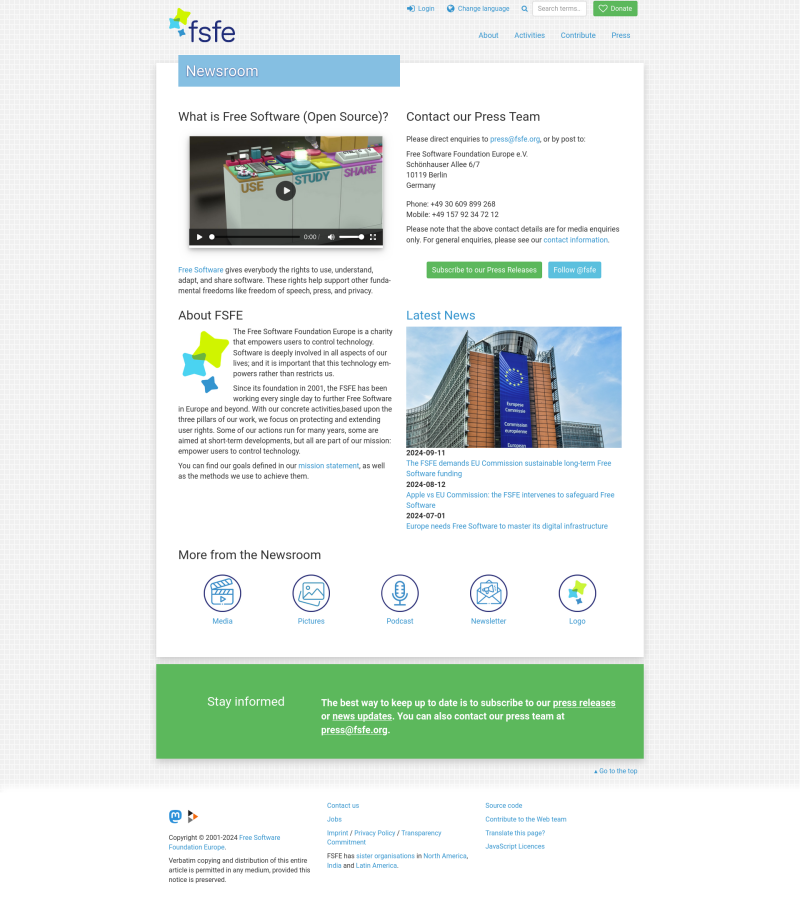 FSFE Press Page
FSFE Press Page
From a technical standpoint, we have the overhauled the translation status page. It now displays the files that need translation for each language, prioritized by the importance of the files—essentially based on how many clicks it takes to reach the page from the front page. The status page also links directly to the source files in Git and the Webpreview tool, which shows the current translated version. This should make it easier to resume translation work. Additionally, for some time now, translated pages with a newer English version have shown a warning indicating that the translation is outdated. Also, currently if a translation is too outdated, instead the EN original will be displayed again.
Another technical improvement that we have done these past months was in the event registration. An event can now be linked to a local or topic group and will automatically be added to the group's calendar, which is accessible from the group overview page and can be integrated into calendar apps via CalDAV, just like other calendars in Nextcloud. For proper integration, events now include start and end times. The existing ICS file also correctly uses these dates, allowing subscribers to see the event times in their feeds. Additionally, events can be automatically sent to the group’s mailing list, though this feature hasn't been used by any group yet. The process for adding events to our events page has also been partially automated—a pull request is automatically generated for new events, collecting all language versions, and the event filename is adjusted accordingly. This version improves clarity, reduces redundancy, and streamlines the explanation. Let me know if you'd like any adjustments!
We also have made some progress in the migration from wiki.fsfe.org to docs.fsfe.org made progress, but still we need to continue working on it during the next months. Last but not least, over the past year we switched from the old ticket system to the new one.
We have also continued with our Software Freedom Podcast. We published this year 4 episodes, which might be a bit less that previous years but the person in charge was during several months in 2024 in maternity leave.
This year, in the podcast we talked about PMPC, the current status of Free Software in our society, in US and Europe, and we had a special episode in Christmas about What is Free Software and we learned about MirageOS.
We also have a number of social media channels, the main ones being Mastodon and Peertube, where we post more frequently, using the ones that are not part of the Fediverse to promote topics and issues related with the main audience of those networks.
Starting with fundraising actions with the Italy mailing campaigns (but this might only be an internal info to share) where we gifted all supporters and ex-supporters a copy of the book and informed them about the activities happening in Italy.
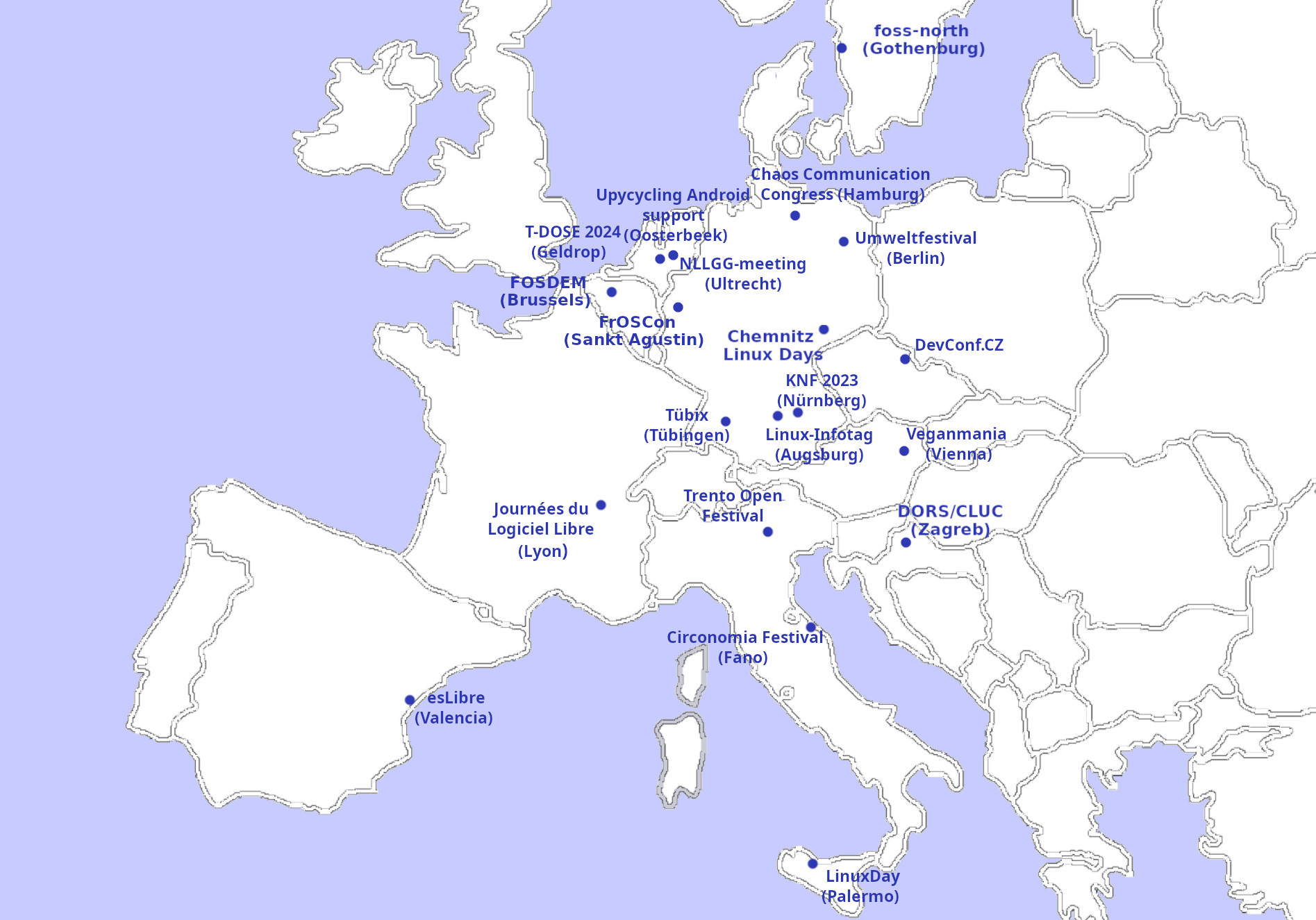 Map showing the different events that we have around Europe
Map showing the different events that we have around Europe
I Love Free Software Day:
I Love Free Software Day" 2024 focused on the younger generations and how to introduce them to the Free Software community. Therefore, several of our local groups celebrated this day with a meeting focused on younger people.
The FSFE planned a special gift for several organisations and long-term volunteers to prepare them for I Love Free Software Day. We gave them an acrylic glass heart and an LED strip, and a microcontroller and some jumper cables. The challenge? To tinker with these things and upload a picture of the heart on 14 February. It turned out to be quite a challenge, but a lot of fun!
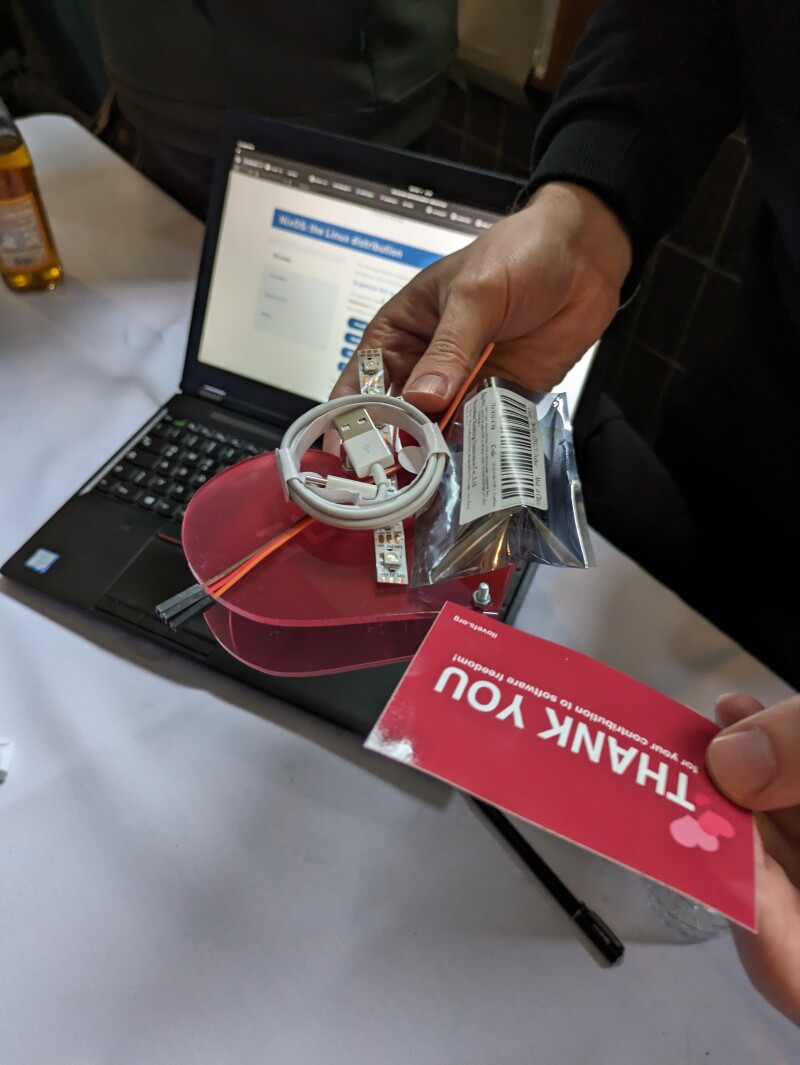
For the 2024 celebrations, over a hundred people came together in 13 local meetings - either online or in person - organised by FSFE chapters or other Free Software groups in seven different countries.
Merchandising and Info Material
This year we worked on adding new stickers to our -already- great collection some new merchandising and stickers.
At the end of last year, we focused on expanding our already impressive sticker collection. With our team's creativity, we developed new slogans and illustrations, resulting in fresh stickers in a variety of colours and formats.
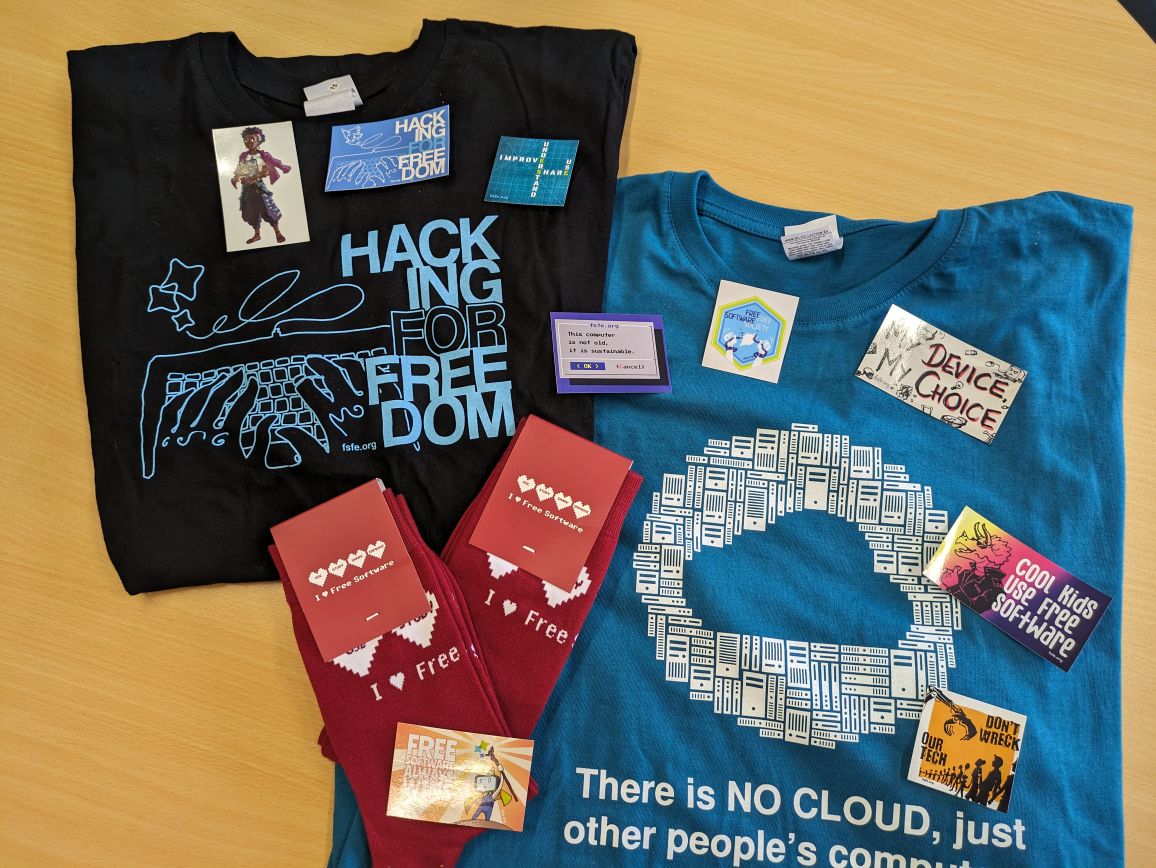
In the months that followed, we attended various conferences and events, where we gathered valuable feedback on these new stickers.
We also took the opportunity to refresh our merchandise. By the end of 2023, we introduced two new T-shirts: a new colour for our classic “There’s No Cloud” design and a striking new graphic for the "Hacking for Freedom" slogan. Both T-shirts have been well-received, alongside another exciting addition to our web shop and event displays—the vibrant red “I Love Free Software” socks.
At the start of summer, we ran a successful sale offering free shipping for two weeks, resulting in over 100 orders, including several large ones.
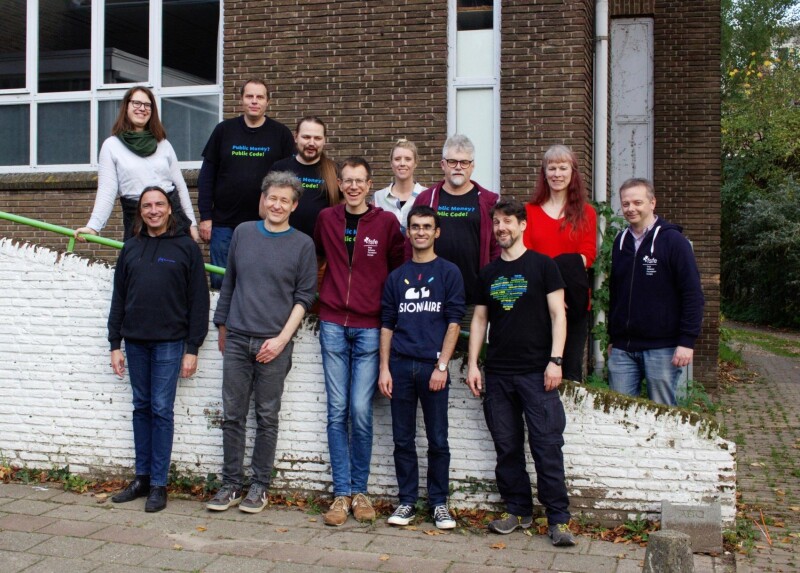 As an e.V. association, the General Assembly of the
FSFE met for its annual meeting last October at Linux Hotel in Essen.
As an e.V. association, the General Assembly of the
FSFE met for its annual meeting last October at Linux Hotel in Essen.
Our community
While our local groups have continued with their activity in their local and regional levels, this year we have continued with the online coordinators’ meetings. Besides organizing booths and being at events -even in Asia- our volunteers have also been involved in several activities such as PMPC, Ada & Zangemann….
This year we also activated a new local group, that is going to focus on Poland
EU election: FSFE Netherlands Coordinator joins Amsterdam's Digital City DebateThis year we also spent a nice day with members of the Italian community in Bolzano, going on a hike with them the day after SFSCON. And in the summer we were back at the LinuxHotel for our now traditional summer meeting! During a long weekend we spent time with volunteers, learning about current work topics and getting feedback. We even had time to get to know each other a bit better with some networking games and in the evenings.
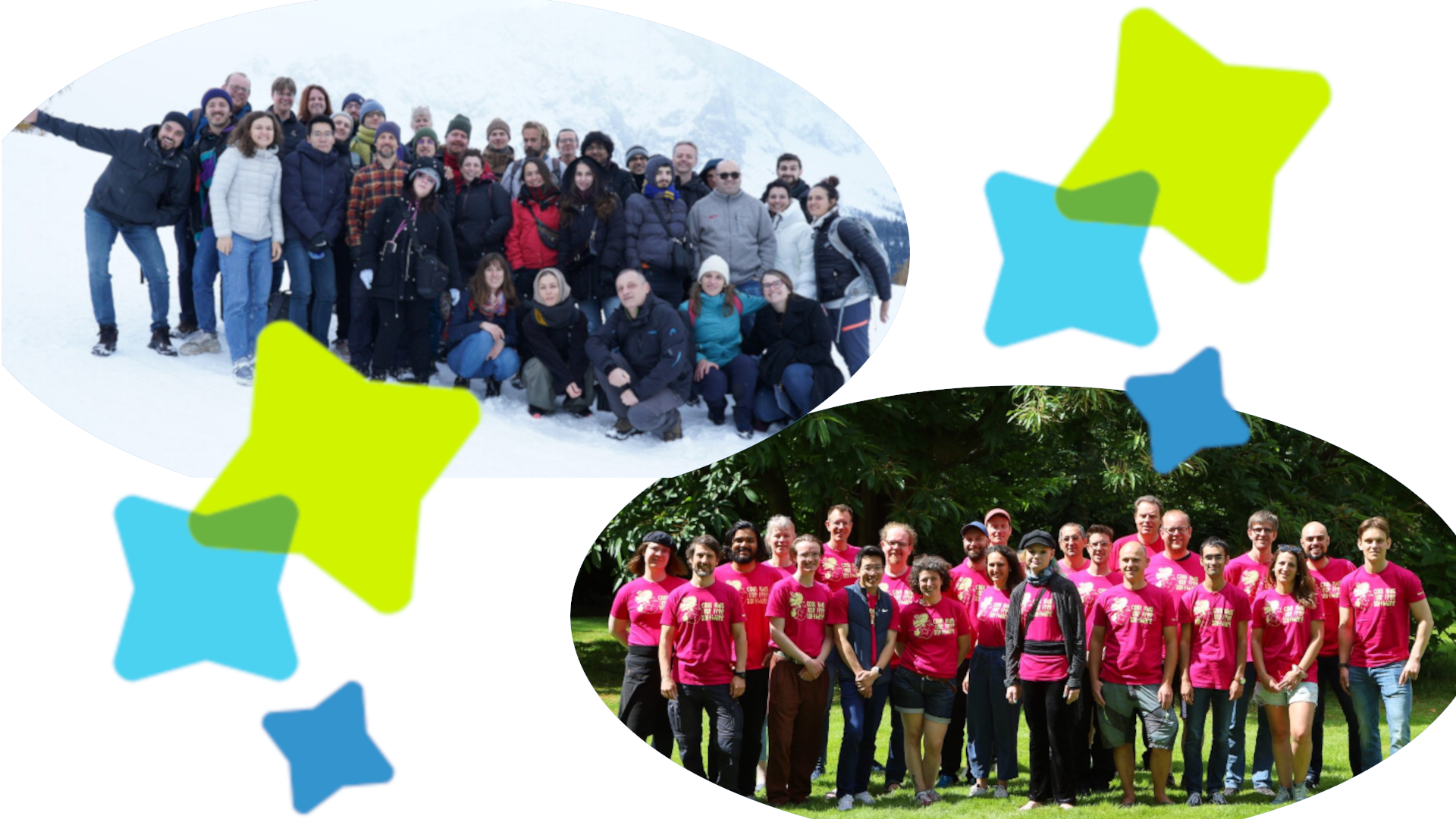
Join the movement
Become a supporter: Your support and contribution for the promotion of Free Software are important for securing our continuous work, ensuring our independence, strengthening our democratic society, promoting and implementing concrete steps towards software freedom, and making it easier to use and develop Free Software.
Advocating for freedom costs money and we depend on people like you to support us. Thanks to all our supporters and special kudos to our donors. We guarantee that all support is used to foster software freedom in Europe a little more each day, step by step, bit by bit for the next decades.
With your help we can keep on defending software freedom. Thank you for your trust, your support, and your ideas to continue bringing Free Software to our society!
